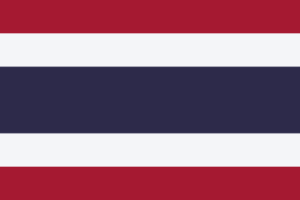
Region: Asia
Disability Definition
According to Thailand’s Constitution, disability is defined as, “persons who encounter certain limitations in performing their daily activities or social participation due to their impairment in vision, hearing, mobility, communication, mind, emotion, conduct, intellect, learning or any other impairment/disabilities along with various difficulties, and specifically need some assistance to enable them to perform their daily activities or social participation same as ordinary persons” (2007b, chapter I, section 4).
Reference: Disability Experience in Thailand, 2015
Legislation
Persons with Disabilities Empowerment Act of 2007: A comprehensive rights-based law for persons with disabilities and contains a strong anti-discrimination section.
States that persons with disabilities shall be fully accepted in their participation in social, economic and political activities equal to others, including accessing necessary facilities and services for them
2007 Constitution of the Kingdom of Thailand: Under Section 43 freedom of people to access work and employment under free and fair competition.
Employer Legal Requirements
The Persons with Disabilities Empowerment Act 2007 – Amendment from 2013: “Employment is that the public and private organizations are required to hire person with disability in the ratio of one disabled person to 100 regular employees. However, the employers who do not comply with the employment of persons with disabilities ratio must send the money to the Fund of Empowerment of Persons with Disabilities.”
Accessibility Requirements
The National Strategic Plan, under the Empowerment of Persons with Disabilities Act encourages barriers-free environments for the participation of persons with disabilities. “Its achievement can be verified by the following:
(a) the level of success in stimulating the issue of barriers-free environment for disability to be incorporated in policies and implementation;
(b) the numbers of laws, rules, and regulations on barriers free environment for disability that have been revised and reformulated;
(c) the amount of knowledge that has been developed to provide understanding on universal design in relation to the enabling environment and accessibility of data, information and news;
(d) the number of educational institutes that organize their pedagogic concepts under a course in universal design;
(e) the number of centers/institutions that promote and demonstrate universal design;
(f) the level of success in establishing agencies or committees to take charge of monitoring, fact-finding, supervising and accepting petitions for undertakings of the enabling environment, with guidelines/measures, plans, programs, activities and agencies in charge of tasks pursuant to each item explicitly assigned.”
Cultural Norms
The recent COVID-19 pandemic brought attention to what needs work in the realm of disability inclusion in Thailand. Many disabled people in the labor force lost their jobs and it is now more difficult for them to find work. There is still a stigma around disabilities that makes disabled workers less valuable to employers.
Business Practices/Examples
Additional content coming soon.Insights
It is estimated that areound 3% or 2 million people have a disability.
The top three conditions in Thailand are,
- mobility disabilities at 50%
- hearing impairments at 18%
- visual impairments at 10%
Supplier Diversity
Additional content coming soon.Talent Sourcing Resources
Additional content coming soon.Additional Resources
The National Association of the Deaf of Thailand – To ensure and strengthen deaf association establishment in every province in Thailand by strengthening the cooperation with governmental agencies, private organizations or organizations for the disabled both national and international.
References
- https://www.ohchr.org › Issues › Disability › OHCHR – Thailand’s implementation on Human Rights Council
- Department of Empowerment of Persons with Disabilities Ministry of Social Development and Human Security, Thailand
- CRPD Country Report Thailand
